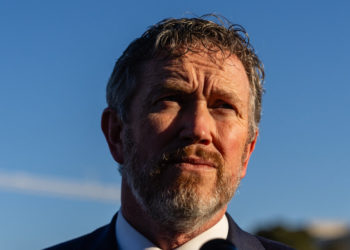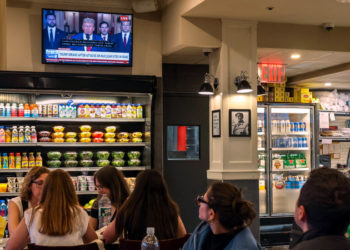It’s a peculiar feature of the NBA that its biggest headlines are routinely generated off the court, at times making the games themselves feel secondary to front-office transactions (and rumors of front-office transactions).
Consider this past season, which concluded on Sunday night with the Oklahoma City Thunder claiming the NBA title after a riveting seven-game series against the Indiana Pacers. Memories of the Thunder will live on—the ruthless efficiency of league MVP Shai Gilgeous-Alexander, the team’s collective defensive brilliance—but the defining storyline of the 2024-2025 campaign came in February, when the Dallas Mavericks sent Luka Dončić to the Los Angeles Lakers in a trade that still confounds the basketball-watching public.
The championship series was itself eclipsed by a pair of blockbuster deals. On Sunday, hours before tip-off in game seven, reports surfaced that the Phoenix Suns traded superstar Kevin Durant to the Houston Rockets. And last week brought the news that Los Angeles Dodgers controlling owner Mark Walter had purchased a majority stake in the Lakers for a reported $10 billion.
Actually, that brings to mind another feature of the NBA, which is that the Lakers are always relevant—even if it’s been almost two months since they last played.
That enduring cachet explains, in part, why Walter forked over such a staggering sum to take over the Lakers from the Buss family, which has owned the franchise since the late Jerry Buss bought his stake in 1979 for $67.5 million. Under the family’s ownership, the Lakers never lacked star power on the roster—from the reign of Magic Johnson and Kareem Abdul-Jabbar in the 1980s to the early-milennium dynasty of Kobe Bryant and Shaquille O’Neal to the current era headlined by LeBron James (and the newly acquired Dončić)—or courtside, where Jack Nicholson and other Hollywood bigwigs have long been fixtures.
The $10 billion figure paid by Walter is notable—not just because it represents the highest valuation ever for an American sports franchise, but also because it does not include the team’s downtown Los Angeles arena, which is owned by Anschutz Entertainment Group.
But what Walter does get is a highly lucrative brand—built on championships and glitz—that transcends the sport.
“It is not just basketball. It’s not just winning. It’s the celebrity. It’s the mix that the Buss family created. It’s that Showtime era,” said ESPN senior writer Ramona Shelburne, referring to the 1980s run immortalized in the HBO series Winning Time. “I think that’s impossible to evaluate.”
Despite Walter’s takeover, the Lakers will maintain continuity in their operations: Jeanie Buss, one of six Buss children, will stay in her role as the team’s governor, while the family’s trust will reportedly keep at least a 15% stake in the franchise.
Still, the sale represents a sea change for Los Angeles, and it comes during a period of considerable tumult in the city. In the same week that Walter bought the Lakers, the Dodgers denied federal immigration officers access to the team’s parking lots.
Walter’s purchase also comes at a time when lucrative media-rights deals have pushed franchise valuations to astronomical heights, forcing leagues (including the NBA) to open the door to private-equity investment. The days of one-team owners such as Buss have given way to an era dominated by the likes of Walter, whose portfolio also includes the Premier League club Chelsea FC.
“They’re not owners who are loyal to one team,” said Shelburne. “They’re investing in these teams as an investment, as a stock.”
Shelburne has covered the Lakers, the Buss family, and Walter for years, dating back to her tenure at the Los Angeles Daily News in the aughts. I caught up with her over the phone on Friday to discuss the sale of what she described as the most popular brand in sports.
The conversation has been edited for length and clarity.
Vanity Fair: You’ve covered both the Lakers and Buss family for quite some time now. Were you surprised when you found out they were selling their majority stake in the franchise?
Ramona Shelburne: Yes, I was surprised they were doing it now. I always thought they would sell to Mark Walter, but I thought it was a few years down the road. I thought that they still had a pretty big interest in doing this and that they were still heavily involved. It didn’t feel imminent, but it had always been teed up for this sale to take place.
Why do you think the family decided to sell now?
I don’t think they decided to sell. I think Mark made an offer they couldn’t refuse. I don’t think they all got together and said, “Okay, now the time is right. We’re going to unload the team.” I think this is just something they couldn’t say no to. They had to talk about it and think about it, and they came to a majority agreement. It was one of these things where I do think they were waiting a couple of years to do this, but they’ve been very comfortable with Mark Walter since they sold him the minority stake four years ago. He’s spent a lot of time with them. There’s a lot of connective tissue between the two franchises, so it made sense to sell to him. They felt comfortable selling to him. And it’s $10 billion. It’s not something you can pass up.
Well, so, perhaps the better question would be: Why did Mark Walter make the move right now?
I just think this is a new era of sports. These are multinational conglomerates now. Mark is one of the savviest investors in the world. He’s one of the savviest financial guys in the world, and if you notice, there’s these empires that are being built by guys like this. There’s Josh Harris in Philadelphia. He’s got a football team, the [Washington] Commanders. He’s got the Sixers. He’s got a piece of an English Premier League team. There’s Stan Kroenke, who’s got a bunch of different franchises. There’s John Henry in Boston. These things are part of a portfolio now. I think for Mark, he sees a lot of value in the Dodgers and the Lakers, and owning all of this, LA sports. He has a Premier League team as well. There’s a lot that this gives to him and I think he’s a savvy investor, but this is part of his sports portfolio.
There have been several franchise sales in the league as of late. The Celtics were sold in March. Mark Cuban sold the Mavericks last year. Is there a reason why so many owners are getting out of the NBA business?
I don’t know that everybody was looking to sell. [Celtics owner] Wyc Grousbeck had to sell because of estate planning. That’s sort of a normal reason why people decide to sell. But I think the rest of it was just literally people making offers they can’t refuse. You may not be looking to sell, but then your franchise is worth $4 billion or $6 billion. Remember when the Suns went for $4 billion, and we were like, “Wow, that’s a huge number”? And then the Commanders broke that record with $6 billion. Then the Celtics topped that, and it’s sort of a frenzy around buying it.
When the Clippers went for $2 billion [in 2014] that seemed like a crazy amount of money, but I think it was just the start of people recognizing how valuable sports franchises can be from a branding perspective in this new world, because there are so few brands that really cut through the cultural zeitgeist anymore. But these franchises do.
I think what’s really striking about the Lakers sale is that it doesn’t include the arena. What makes the team’s brand so valuable by itself, even without that infrastructure?
As much as you look at that valuation and go, Oh my God, it’s also also kind of right. If you put that on the open market, I think that’s what it would go for, if you put that out there and you had a bidding process. I think the Lakers are the most popular brand for a sporting team in the world. I’m sure there will be people who disagree with me and say it’s the Yankees or the Cowboys or Barcelona or Real Madrid or whatever. Maybe it’s a soccer team. Maybe it’s Man U. But I think every continent in the world, every person in the world, knows basketball. Baseball doesn’t cut through on every continent. Football is huge here, but does anybody care about the Cowboys around the world the way they care about the Lakers?
I remember being in China for the Olympics in 2008 and people didn’t speak the language, but I’d mention Kobe Bryant and they would be like, “Yeah, we know Kobe!” It is not just basketball. It’s not just winning. It’s the celebrity. It’s the mix that the Buss family created. It’s that Showtime era. I think that’s impossible to evaluate.
This does feel like a watershed moment for sports owners. Jerry Buss was this local LA businessman. He took over the team in the late ’70s, and treated it essentially as a family business. But with these franchise valuations rising like they are, there are only so many billionaires who can even afford a team. Do you think that this is the end of an era? It seems like the Buss family represented the last generation of a certain type of owner.
I have this theory about how you see different kinds of owners in every era of the NBA. In the era when Jerry Buss came up, most of the owners were really big in real estate or oil. Those were the industries where you could make that kind of money. Then we had tech bros like Cuban. So now what we have are guys like Mark Walter and Josh Harris who made their money in private equity, and who really understand high-level finance and how you structure deals like this. These kinds of deals are new. Private-equity funds can be part owners of NBA teams now. They can be part owners of multiple teams. They have pieces of a few different franchises. They’re not owners who are loyal to one team. They’re investing in these teams as an investment, as a stock.
Mark Walter now owns the two crown jewels in the Los Angeles sporting market, so I wonder if he’ll become a sort of pillar of the community. There’s been a lot of turbulence in the city this year, from the wildfires to all of the unrest this past month. Do you expect him to be the type of guy who speaks out on local matters like that?
No, it’s not his personality. I know Mark very well. He’s a behind-the-scenes guy. He’s very content to let other people be the forward faces of his empire. You saw that right away when he had Magic Johnson be a part of his ownership group with the Dodgers. You would’ve thought Magic bought the team with how much he was out there. Magic was the face of that, and Mark’s the money man. I think Mark enjoys being an owner, but he’s a quiet behind-the-scenes guy.
He’s not looking to be on TV, or be some politician or public figure. When he first became owner of the Dodgers, he would do a lot more. He would go on the field and talk to the reporters. He’d be quoted all the time. He was just more candid, and sort of trying to be open. I think what’s changed is he’s much more in the background now, and I don’t think that he wants a high profile. I think he just wants to own the teams and operate them very well, and that’s what he has done so far. He’s very passionate about the teams, but he hires good people to run them, and then he sits back and enjoys the game.
Do you think that’s why he’s letting Jeanie Buss maintain her front-facing role?
Well, first of all, it was his idea. This wasn’t a condition of Jeanie saying, “I’ll only sell to you if you let me stay.” This is Mark saying, “I value who you are and what you do.” The one thing Jeanie Buss knows how to do is to keep that brand value high. That’s what her father created, that Showtime atmosphere, and there’s nobody better at understanding how to maintain that brand. He knows what he bought. He bought a brand and a basketball team, but he really bought a brand. So she’s very valuable to this franchise and transaction. I know people are reacting to this idea that she’ll still be in charge—I think it’s kind of missing the plot. Yeah, she’s the owner and she gets the final stay on basketball decisions right now. I don’t know what that will look like in the future, but she had a role before when her dad was in charge. She had a role like this before when her brother ran the basketball side of things. I think it’s what she’s done for the last 40 years.
More Great Stories From Vanity Fair
-
Brokeback Mountain Started as a Punch Line. 20 Years Later, It’s an Undisputed Classic
-
Meet the Lawyer Who Keeps Suing Elon Musk
-
Everything to Know About Jeff Bezos and Lauren Sánchez’s Wedding
-
First, Ryan Coogler Made Sinners. Now He’s Living the Movie’s Dream
-
Karen Read Tells Her Story
-
The Outrageous Mitford Sisters: The 20th Century’s Most Fascinating Family
-
The Chaos Inside Johnny Depp and Amber Heard’s Wedding
-
The Best TV Shows of 2025, So Far
-
From RFK Jr. to Patrick Schwarzenegger, a Brief Guide to the Kennedy Family
-
The Story Behind Surviving Ohio State
-
From the Archive: Marlon Brando, the King Who Would Be Man
The post “It’s Not Just Winning. It’s the Celebrity”: Inside the Los Angeles Lakers’ Record-Setting Sale appeared first on Vanity Fair.




